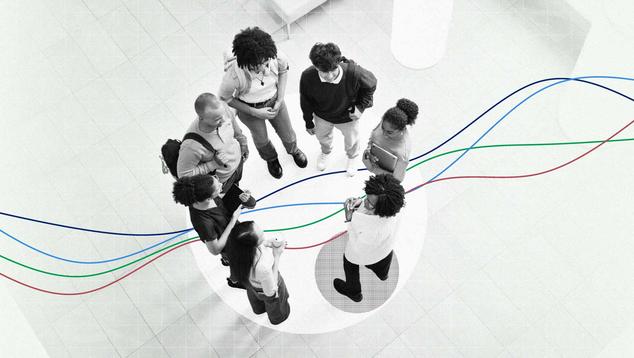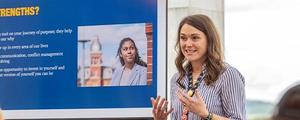Every year, more than 500,000 college students across the U.S. discover their CliftonStrengths.
After studying college students who attend schools that offer CliftonStrengths and strengths-based programming, Gallup researchers identified three core themes in the most successful programs:
- at least five conversations about strengths
- an in-depth conversation about real-life application
- strengths-based mentorship
For many, identifying their natural talents is an important step toward self-discovery, creating opportunities to develop their natural talents into strengths and apply those strengths in their personal life, education and career.
Gallup has found a strong relationship between CliftonStrengths programming and outcomes like student engagement and retention. Best-in-class programming elevates additional student outcomes such as confidence, resilience and career readiness.
Five Conversations About Strengths
Conversations about CliftonStrengths deepen a student’s self-understanding and highlight ways they can apply their strengths to real-world challenges.
Students who talk about their strengths with a variety of people -- peers, friends, partners, faculty, advisors and family members -- are more likely to feel confident, resilient and prepared for life after graduation.
The more conversations a student had about their strengths, the more likely they were to strongly agree that they understand how their strengths help them overcome challenges and that they are well-prepared for life after college.
For higher education professionals, this underscores the importance of integrating strengths-based conversations into multiple aspects of student life -- academic advising, career counseling, peer mentoring and even family engagement initiatives.
Integrating more strengths-based conversations into a college or university’s programming can be simple: Ask students to review their CliftonStrengths assessment results with someone they know and discuss how their natural talents “show up” in their everyday life based on insights from their strengths profile.
An In-Depth Conversation About Real-Life Application
When students were asked to describe their most meaningful conversations about their CliftonStrengths, their responses revealed a common theme: These conversations answered key questions students have about themselves and their future:
- Do the results describe me?
- How can I better explain who I am to other people?
- How can I better understand the people around me?
- How do I work best with others?
- What does my future look like?
Here is how students described their experiences:
- “Individualization was my top strength, and it was perfect because this was something I did that I didn’t know how to put it into words.”
- “I found it meaningful that we each had different strengths despite having the same major and were able to discuss how we individually can approach our major given these.”
- “Where I do not have strengths, my mentors, family members, significant other or advisers might, and there is value in utilizing skills that I am not as proficient in to save time on both ends.”
After a student takes the CliftonStrengths assessment, higher education leaders who offer best-in-class strengths-based programming facilitate extended conversations centered around the five questions above. Whether through workshops, group discussions or one-on-one advising sessions, helping students connect their strengths to their relationships and work can bring CliftonStrengths to life.
Strengths-Based Mentorship
Strengths-based mentorship plays a critical role in student development. A strengths-based mentor -- whether a professor, advisor, coach, work-study supervisor or peer leader -- helps students apply their strengths to daily tasks and interactions. Such a mentor provides students with ongoing, strengths-based feedback that focuses on self-confidence, positivity and growth.
However, only 17% of college graduates strongly agree that they had a mentor in college who helped them understand their strengths.
CliftonStrengths provides a natural platform for mentor relationships. Higher education leaders can foster strengths-based mentoring by:
- training academic advisors, faculty and peer mentors to incorporate CliftonStrengths into their conversations with students
- identifying existing courses, extracurriculars, athletics and work-study experiences in which students and mentors can integrate CliftonStrengths into an existing framework
- encouraging upperclassmen to mentor underclassmen using a strengths-based framework or integrating CliftonStrengths into an existing mentorship framework
- providing professional development for faculty and staff to become certified CliftonStrengths coaches
When students have access to mentors who help them see the connection between their strengths and their successes, the impact of CliftonStrengths programming grows tremendously.
Strengths Programming That Works
Strengths-based development is not one-size-fits-all -- successful programming varies depending on a campus’ resources and goals.
Whether an institution is just beginning to explore strengths-based programming or wishing to enhance an existing initiative, these strategies -- having conversations with students about their strengths and how to apply them and facilitating strengths-based mentorship -- can maximize the impact of CliftonStrengths. By creating opportunities for students to apply their unique talents to regular activities, higher education professionals can empower students to do what they do best.
Use strengths to help prepare students for their future.
- Discover the steps for a successful CliftonStrengths for Students initiative.
- Learn more about how West Virginia University is connecting strengths to student development.
- Explore the data on strengths’ effect on student engagement and retention.




